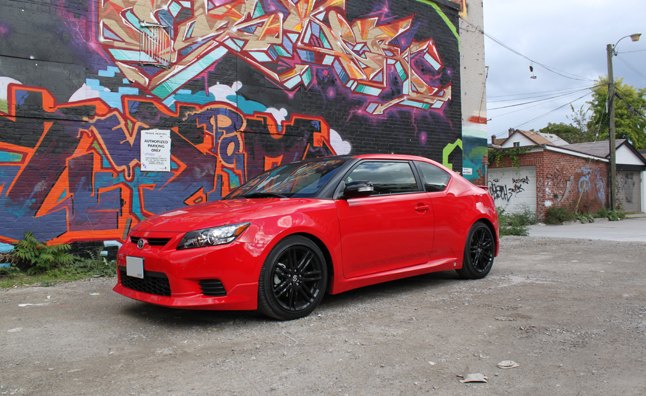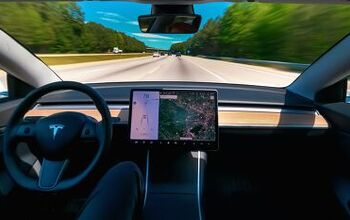Generation Why: J.D. Power's Top Ten Gen Y Vehicles For 2012
Until the research arm of TTAC gets more funding, we’ll have to rely on data from third-parties like J.D. Power. The venerable outfit recently compiled a list of the Top 10 cars with the highest percentage of Gen Y buyers. The results aren’t entirely surprising.
J.D. Power’s definition of Generation Y consists of buyers aged 16-35. Rather than the penniless youngsters mostly covered in this series, their study also takes into account older members of this cohort who are earning much more, with stable career prospects – maybe even families. No surprise then that four door cars, whether sedans or hatchbacks, tend to dominate the list. Of the 10 cars, only one was a domestic and only one came from a luxury brand. The rest were from mainstream imports, with 6 of the 10 from Japanese brands and 3 from the Germans. No Korean cars cracked the list, which at first glance seems surprising. But we’ve heard through the grapevine that Hyundai products, even the Veloster, tend to skew older. Also missing was Honda, something that would have been unthinkable not too long ago, though Acura was well represented.
10. Acura TSX
Percent of 2012 buyers in Gen Y: 34.3
Year-over-year change in Gen Y buyers: +0.7%
Comment: The bright spot of Acura’s car lineup. Just premium enough to look successful, but also sensible. Does not have the negative connotations that come with certain luxury brands.
9. Dodge Charger
Percent of 2012 buyers in Gen Y: 34.7
Year-over-year change in Gen Y buyers: 0.9%
Comment: The lone domestic. Notice there are no Ford hatches here. It looks like a brawny, masculine car…perfect for those who need a family sedan but can’t bear the thought of a CamCord.
8. VW Golf
Percent of 2012 buyers in Gen Y: 34.7
Year-over-year change in Gen Y buyers: 1.6%
Comment: The “premium” choice for C-segment cars. Not a surprise. The TDI is lumped in with the Golf.
7. VW Jetta
Percent of 2012 buyers in Gen Y: 35.2
Year-over-year change in Gen Y buyers: 33.9%
Comment: Not a surprise. VW badge has cachet, the price is right.
6. Subaru Impreza
Percent of 2012 buyers in Gen Y: 37.4
Year-over-year change in Gen Y buyers: -7.1%
Comment: Subaru is a bit of a quirky choice but a darling of the winter sports crowd and those who grew up on Gran Turismo.
5. Mazda3
Percent of 2012 buyers in Gen Y: 40.2
Year-over-year change in Gen Y buyers: -2.3%
Comment: A good sign for Mazda. The 3 is also seen as a bit of a step up from the usual choices, and Mazda can only benefit from a younger customer base.
4. Acura ILX
Percent of 2012 buyers in Gen Y: 40.2
Year-over-year change in Gen Y buyers: N/A
Comment: I was wrong here. I panned it for being a silly product with no appeal. These figures don’t tell the whole sales story, but they do tell something.
3. VW GTI
Percent of 2012 buyers in Gen Y: 44.5
Year-over-year change in Gen Y buyers: -0.8%
Comment: Ask any car guy or girl what they’d buy for under $30k and there’s a good chance it’s a GTI. No surprise here.
2. Mitsubishi Lancer
Percent of 2012 buyers in Gen Y: 48.6
Year-over-year change in Gen Y buyers: 5%
Comment: The Ralliart and EVO are lumped in with Lancer, but it may also have something to do with Mitsubishi’s financing deals. This car is a dog.
1. Scion tC
Percent of 2012 buyers in Gen Y: 50.2
Year-over-year change in Gen Y buyers: -0.4%
Comment: The FR-S gets all the hype, but the tC is top dog. Maybe things will change next year?
More by Derek Kreindler
Latest Car Reviews
Read moreLatest Product Reviews
Read moreRecent Comments
- Theflyersfan OK, I'm going to stretch the words "positive change" to the breaking point here, but there might be some positive change going on with the beaver grille here. This picture was at Car and Driver. You'll notice that the grille now dives into a larger lower air intake instead of really standing out in a sea of plastic. In darker colors like this blue, it somewhat conceals the absolute obscene amount of real estate this unneeded monstrosity of a failed styling attempt takes up. The Euro front plate might be hiding some sins as well. You be the judge.
- Theflyersfan I know given the body style they'll sell dozens, but for those of us who grew up wanting a nice Prelude Si with 4WS but our student budgets said no way, it'd be interesting to see if Honda can persuade GenX-ers to open their wallets for one. Civic Type-R powertrain in a coupe body style? Mild hybrid if they have to? The holy grail will still be if Honda gives the ultimate middle finger towards all things EV and hybrid, hides a few engineers in the basement away from spy cameras and leaks, comes up with a limited run of 9,000 rpm engines and gives us the last gasp of the S2000 once again. A send off to remind us of when once they screamed before everything sounds like a whirring appliance.
- Jeff Nice concept car. One can only dream.
- Funky D The problem is not exclusively the cost of the vehicle. The problem is that there are too few use cases for BEVs that couldn't be done by a plug-in hybrid, with the latter having the ability to do long-range trips without requiring lengthy recharging and being better able to function in really cold climates.In our particular case, a plug-in hybrid would run in all electric mode for the vast majority of the miles we would drive on a regular basis. It would also charge faster and the battery replacement should be less expensive than its BEV counterpart.So the answer for me is a polite, but firm NO.
- 3SpeedAutomatic 2012 Ford Escape V6 FWD at 147k miles:Just went thru a heavy maintenance cycle: full brake job with rotors and drums, replace top & bottom radiator hoses, radiator flush, transmission flush, replace valve cover gaskets (still leaks oil, but not as bad as before), & fan belt. Also, #4 fuel injector locked up. About $4.5k spread over 19 months. Sole means of transportation, so don't mind spending the money for reliability. Was going to replace prior to the above maintenance cycle, but COVID screwed up the market ( $4k markup over sticker including $400 for nitrogen in the tires), so bit the bullet. Now serious about replacing, but waiting for used and/or new car prices to fall a bit more. Have my eye on a particular SUV. Last I checked, had a $2.5k discount with great interest rate (better than my CU) for financing. Will keep on driving Escape as long as A/C works. 🚗🚗🚗












































Comments
Join the conversation
One problem with this that I noticed is that it is the percentage of buyers. I'm Gen Y (19-years-old in college), and I drive a Subaru BRZ. But I didn't buy, my dad did. So technically using these numbers, the car was bought by a 63-year-old man. I think that there are quite a few cases that fall into this category.
Ugh. I hate that Gen "Y" moniker. Anyhow, being myself perfectly in the middle of this demographic, I would consider...none of these, save for a Jetta. And then only a wagon. I am 28, college educated with a wife, kid and another kid in the oven. I am a hopeless suburbanite. I'd much prefer something twice my age. Something easy to work on, big, and of course...something that actually has personality. Then again, I've always been kinda...different from my peers.